We know videos of cute animals are all the rage today on Instagram and TikTok. And one popular trending topic is guinea pigs swimming around without a care in the world.
The question needs to be asked though — do cavies enjoy swimming? Or are these fluff balls being put in stressful situations for the likes and views?

If you’re about to plan a pool party for your guinea pigs, read this first. Jump into the deep end of everything cavies and water-related and have all the information you need to keep your little critters safe (and dry).
Tip: Guinea pigs and hamsters may look alike, but they aren’t the same. Learn more about the differences between them here.
Can a guinea pig swim?
Cavies can swim, but for them, swimming can be potentially lethal (more on that further in), or at the very least, unpleasant. Wild guinea pigs are not often found frolicking in ponds and puddles in their natural habitat, but they have been seen swimming just fine if they absolutely must.
However, don’t confuse guinea pigs with capybaras, the world’s largest rodents that live in the Amazon Jungle of South America, and are known to be excellent swimmers, even in large bodies of water.
So should you take your pet guinea pig swimming? Preferably not. They’re not natural swimmers, but some water play in shallow water is okay if you supervise and ensure their feet can touch the ground with their head above water.
Guinea pigs are intelligent, and they have natural instincts and reactions. So if your worry is that they accidentally fall into water, there’s no need to fret as you’ll likely find them paddling to safety. If they’re too far out, though, they can tire very quickly, which might not end well.
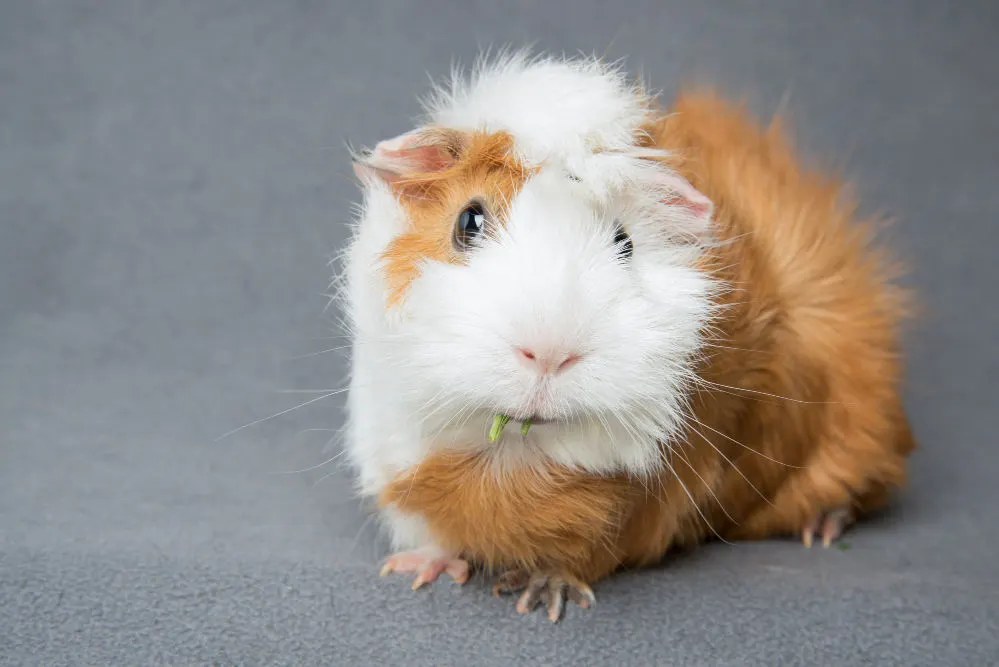
Also, never put them in your chlorine pool. The chemicals can cause skin disease, respiratory problems, and infections if they have any open wounds or scratches.
Dangers of swimming
Just because piggies can swim doesn’t mean they might like to. Despite the potential emotional distress that many guinea pigs experience when made to swim, there are also real dangers to their health. Serious health issues are common in guinea pigs, including bumblefoot (pododermatitis), upper respiratory infections, abscesses, flystrike, and more.
Let’s examine all the additional risks connected with swimming for guinea pigs.
Ear infections
Guinea pigs can develop ear infections from water that remains in their ear canals, much like people can. For our cavy friends, ear infections can spread farther within the ear, which may harm their neurological system and cause death, although this is the extreme case.
Some signs of an ear infection in guinea pigs are ear pain, pus or discharge from the ears, and loss of hearing or deafness.
Pneumonia
Pet owners know how poorly domestic guinea pigs can regulate their body temperatures. These critters run a high risk of contracting pneumonia if they stay in cold water for any length of time. Signs of pneumonia in your piggies include sneezing, discharge or oozing from the nose, and difficulty breathing.
But what about bath time? To avoid this potentially fatal illness, you must dry off a wet guinea pig entirely and immediately after a warm bath. Microfibre towels are the best option to ensure all the water in your cavy’s fur is absorbed.
Depression
Just placing your furry potato in water can stress them out as much as putting them in a pool or tub to swim can. Many cavies have a deep fear of water — something that has been utilized in the study of antidepressants.
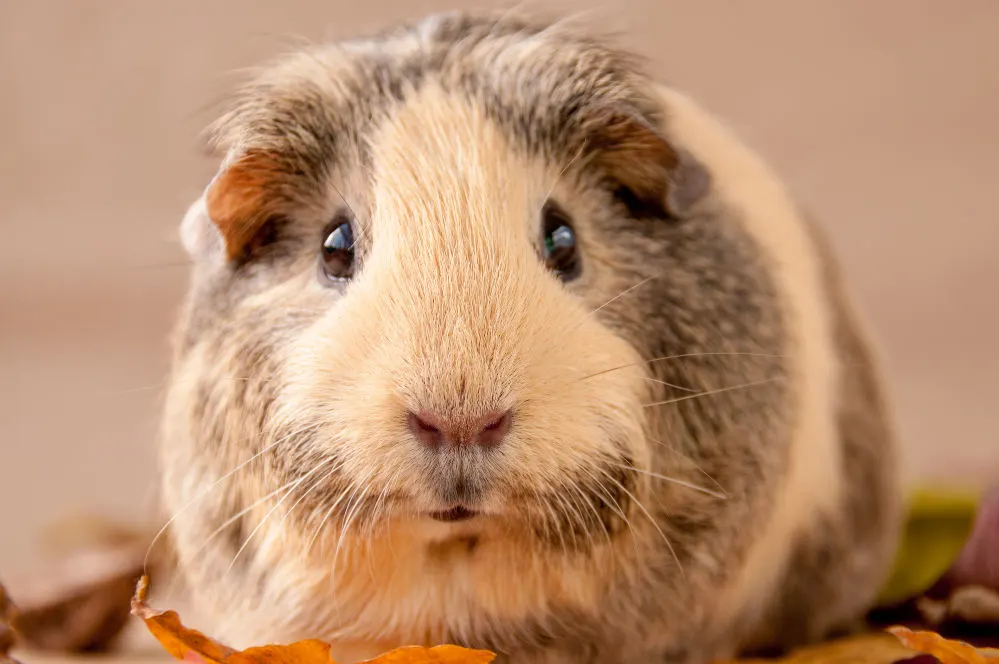
Because they have such a fear, guinea pigs were given antidepressants to test out if that makes them more likely to go near or in water. If they went in the water without an issue, the antidepressant was deemed a good candidate for humans.
However, your cavy doesn’t have medication to help curb their fear of water. If you continuously force them into water they don’t want to be in, they will become withdrawn and possibly even start hiding when you come near them. Nobody wants their pet to be afraid of them.
Respiratory tract infection
Cavies don’t have a high threshold for cold and cannot easily regulate their body temperature. So any water on a guinea pig’s skin that isn’t removed could eventually result in hypothermia or a respiratory tract infection.
Regardless of how much swimming they’re doing, it might be worth a trip to the vet if you do catch your piggy coughing a lot. Other signs include nasal discharge, fever, weight loss or decreased appetite, and difficulty breathing.
Stress
Guinea pigs are adorable but timid and uneasy critters. If you want to keep them happy and healthy, don’t put them in uncomfortable situations of unnecessary stress. A trip to the vet might stress them out, but it’s usually needed. Putting them in a body of water to swim has no point, so why stress them out if it won’t help them?
Stress and worry negatively impact the immune system. So if your guinea pig experiences excessive stress for long periods of time, there is a strong likelihood that they will become susceptible to infections. This includes other ailments and related diseases for which they were not previously at risk.
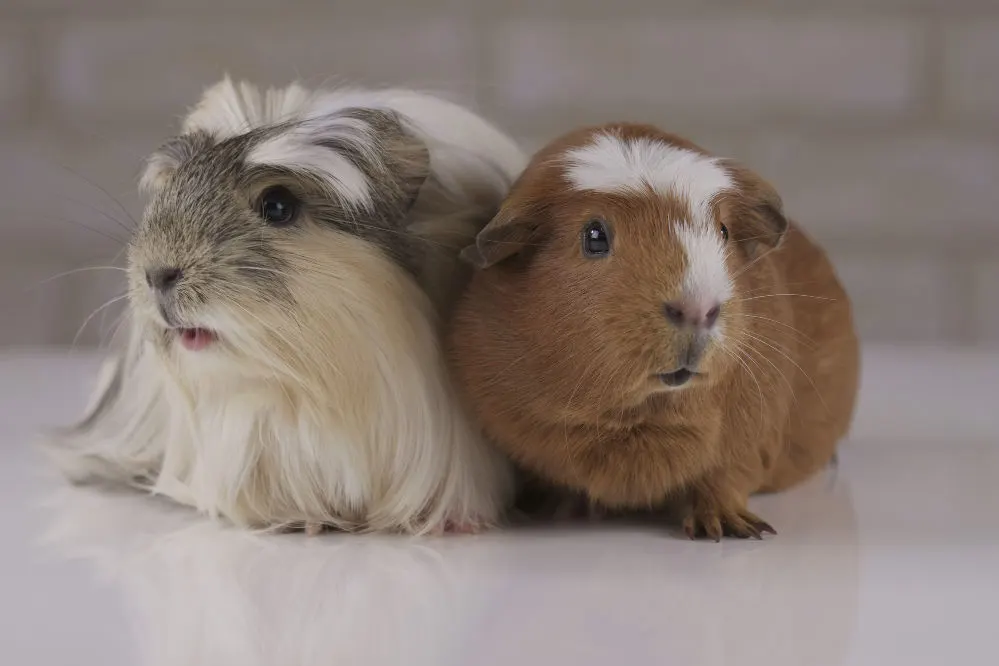
Some common signs your cavy might be stressed out include overgrooming and chewing the bars of their cage. Also hiding more than usual, aggression, reluctance to move, and changes in their eating habits.
Exhaustion
If you want to teach your pet cavy to swim for your own amusement and because you saw numerous videos and want to recreate them, prepare to be close by and catch them when they tire.
One of the problems with swimming is exhaustion. Guinea pigs have small legs, and their internal muscles are not built for swimming. They sink easily and need to move constantly to stay above water. Eventually, your cavy will tire of swimming because they simply can’t continue, and they’re at a serious risk of drowning if you’re not paying attention.
Skin diseases
Guinea pigs have coats that shield them from the elements and protect their skin, and they also have natural oils that keep their skin healthy. You may be aware that natural coconut oil must occasionally be applied to the skin of hairless cavies to prevent dry skin, as they do not produce these oils without a coat.
Even for fur-coated cavies, their skin’s natural oils can be washed away when they get wet, which can cause skin irritations. Also, if your pig gets a wound on their skin and the swimming pool water contains chlorine or other chemicals, they could develop a potentially fatal infection.
The first sign of skin disease in guinea pigs is usually hair loss. However, this can also be caused by more common problems, such as lice, mites, or even a fight with their cage mates. It’s crucial to take your cavy to the vet anyway, just to be sure. If you notice your little pet scratching a lot or biting themselves, they might have any one of these issues mentioned above.
Can you bathe a guinea pig?
Nobody is preventing you from bathing your guinea pig. A bath may be essential depending on your cavy’s skin and hair condition — especially long-haired guinea pigs. To prevent infection, piggies should be kept as clean as possible. However, the majority of guinea pigs can generally keep themselves clean and hardly ever require a wash.
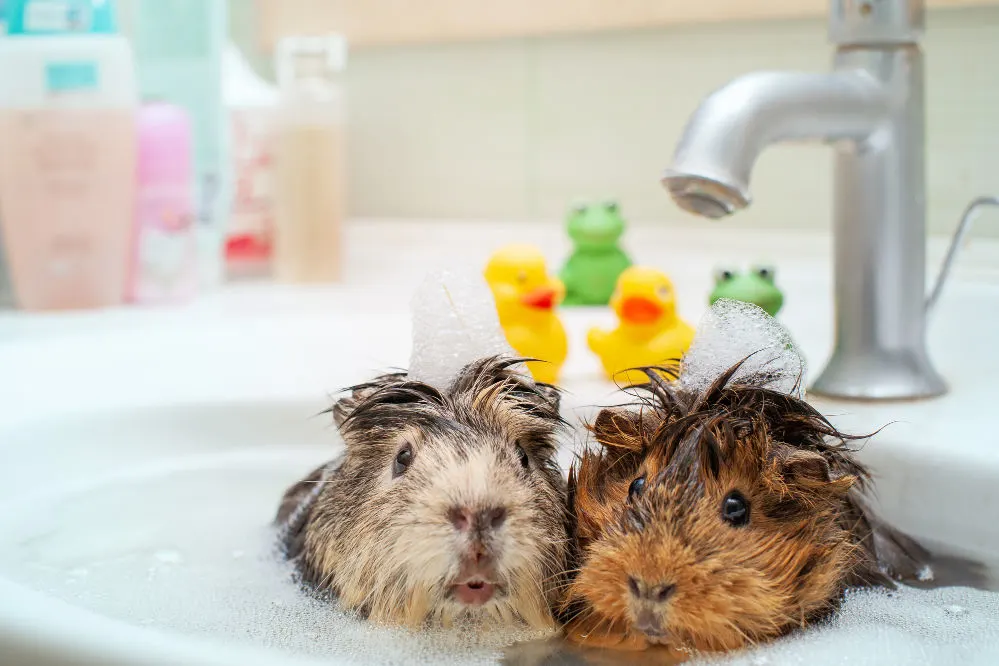
Just bathe your guinea pig a few times a year, and only when essential. If your piggy has excrement or urine embedded in its skin or hair, you should bathe them. These circumstances often lead to flystrike in guinea pigs, especially those with long coats, as waste can get stuck in their hair more easily.
Bathing guinea pigs safely
Try a stream of fresh water first if your cavy detests being in the water. When it comes to the temperature of the water, you should only use lukewarm water and rinse your pet afterward. You have to use a special shampoo for guinea pigs since this tiny rodent is also particularly sensitive to soap, which can cause skin irritation, dandruff, or allergic dermatitis.
Never put a cavy in the tub while bathing them – instead, hold them in one hand and use the other one to wash and rinse them. Dry them off with a good-quality towel afterward. Then use a hairdryer on the lowest setting to dry them thoroughly. If your pet freaks out, let them dry naturally in a warm environment and rather leave the hair dryer behind.
Do some guinea pigs like swimming?
There are certainly exceptions to the norm, and some piggies may prefer splashing in the water. Your little rodent might be one of the uncommon guinea pigs that enjoy playing around in the water like a Labrador. Do a supervised swim test in your bathtub or kitchen sink if you think you have a sea pig on your hands.
Try placing them in a sink or bath tub filled with warm water about an inch deep. During their entire time in the water, keep an eye on them. Remove and dry them off if they exhibit signs of stress, weariness, or other symptoms.
It’s important to remember, that even if your piggies seem to love the water, they still stand to suffer from infections if they are left wet or cold for too long. So even with a water-baby guinea, don’t allow swimming to go on for too long.
Can you use cool water on your cavy when it’s hot out?
If you experience scorching summer days, you might wish to assist your guinea pig in cooling off. There are plenty of ways to do this without using water.
- An ice pod or a cooling mat is among the best ways to keep your cavy as cool as a cucumber. With none of the hazards associated with contact with water, this provides all the advantages of keeping their body temperature low without stressing them out.
- Another choice is to put some of your guinea pig’s favorite fruits and vegetables on a plate and add enough water to cover their feet. This works especially if they are motivated by food (and what cavy isn’t?).
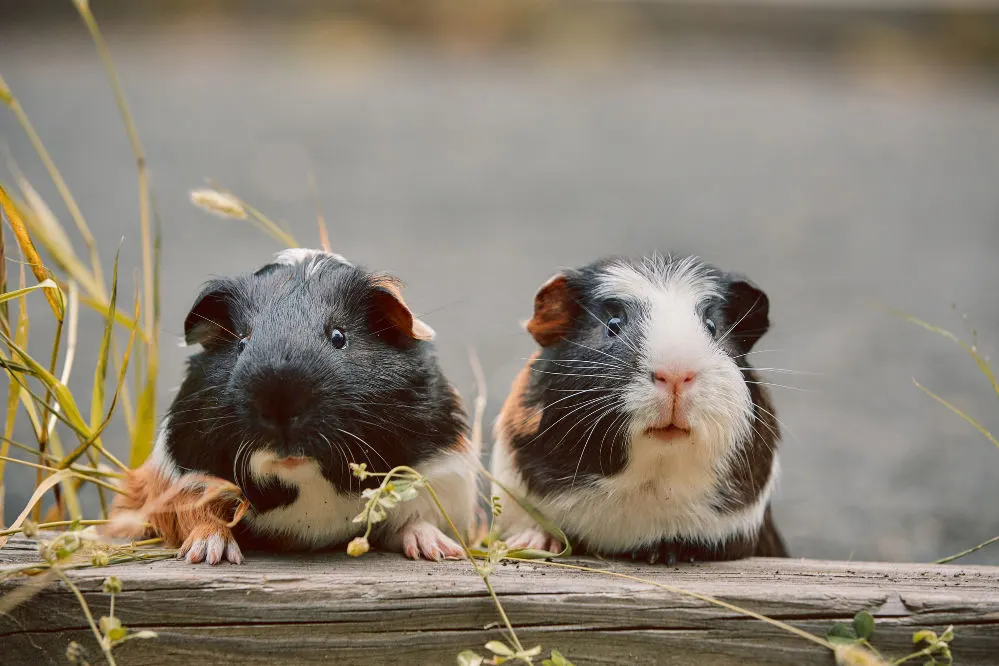
Your pig may step onto the plate to eat a delectable piece of kiwi, depending on how alluring the snacks are and how daring your cavy is. But remember that your cavy should never be compelled to remain in the water and should always have the choice to leave the dish when they’re ready.
- You can also give them some frozen fruits as a treat. It has the advantage of cooling them down and is a nice snack that can last them a while. How long does it take your cavy to get to the center of a frozen strawberry chunk? Just make sure to cut the frozen fruit into large enough pieces so that they won’t be a choking hazard.
What exercises can cavies do if not swimming?
Foraging for food, grazing, and playing with other pigs in their cage are three of a guinea pig’s favorite activities in the world. Your cavies will remain emotionally and physically healthy if you take the time to furnish their habitat with haystacks, chew sticks, tunnels, hiding places, and toys.
- Balls, tunnels, and other playthings can be placed in the guinea pig cage for the animals to enjoy. Alternatively, locate a secure space within your house, spread out a towel, and arrange some vegetables and toys on it for your cavy to play with and eat.
- Playing outside in a protected run is another risk-free and enjoyable activity for your guinea pigs. Your cavies will enjoy floortime on the grass while squeaking to their heart’s content. Put them in a maze outside and watch them try to find their way to the treat in the middle. It’s fun for both you and your fluffball. Again, never leave them unattended, and ensure they can access toys, food, and water in their run.
- Bring the playtime indoors on chilly days. Your piggies will have a blast if you hide treats in tunnels and hiding spots. Just watch out for chewable electric cables and keep rambunctious pets away from anything they should not be chewing on.
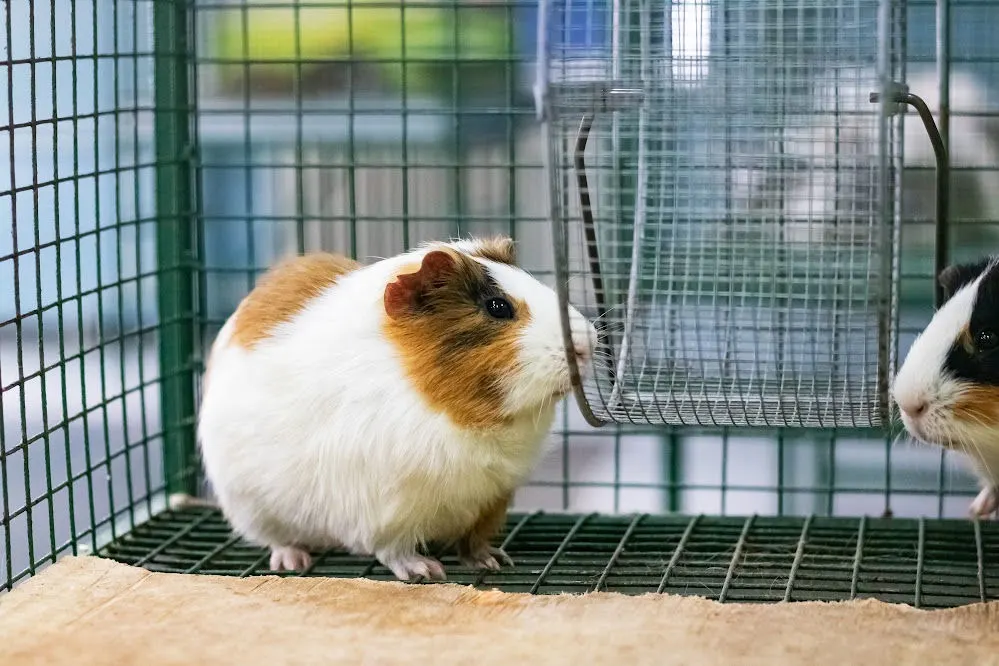
Final thoughts on swimming cavies
Cavies like various activities, but swimming is not typically one of them. And if you force them into a pool or puddle of water, they may become ill, experience stress and anxiety, or even develop a fear of you. No guinea pig owner wants to see their little friend in distress (although they’re not so little in size), so we suggest leaving behind your dream of an Olympic gold medal in guinea pig swimming.
If you want a pet that likes being in the water, consider getting your cavy a fish friend. Perhaps they can stare at each other from their homes and build a long-distance bond.
Steph Dyson is a travel journalist by trade but a lover of all small pets. She’s been a pet mum to everything from gerbils to guinea pigs, rabbits to hamsters, and fish to dogs of all shapes and sizes. She wants to share her years of experience with small pets and make Small Pet Guides the go-to website for pet owners seeking information and care advice.

